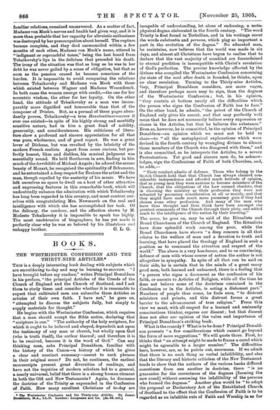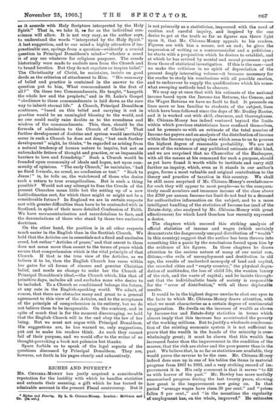and therefore perhaps more easy to sign, than the dogmas
of the Westminster Confession ; but, in his opinion, "they contain at bottom nearly all the difficulties which the person who signs the Confession of Faith has to face."
On the other hand, he admits, "the priest of the Church of England only gives his assent, and that may perfectly well mean that he does not necessarily believe every expression or clause in the Articles, but that he believes the substance." Even so, however, he is committed, in the opinion of Principal Donaldson—an opinion which we must not be held to share—to "all the metaphysical explanations which were devised in the fourth century by wrangling divines to silence those members of the Church who disagreed with them," and is also committed, as he interprets the Articles, to a severe Protestantism. Yet good and sincere men do, he acknow- ledges, sign the Confessions of Faith of both Churches, and, he adds,—
" Their conduct admits of defence. Those who belong to the Scotch Church hold that that Church has always claimed con- siderable independence and afforded much latitude of opinion, that as young men they were anxious to become ministers of tho Church, that the obligations of the Law seemed obsolete, that in choosing the ministry as their profession they were not actuated by pecuniary consideration at all or mainly, and that they might have made much more pecuniary gain if they had chosen some other profession. And many of the men who have thus thought and thus think have been amongst the greatest ornaments of the Church through their piety, and added much to the intelligence of the nation by their learning."
The same, he goes on, may be said of the Ritualists and Broad Churchmen of the Church of England. The Ritualists have done splendid work among the poor, while the Broad Churchmen have shown "a deep concern in all that relates to the welfare of man and a devotion to truth and learning, that have placed the theology of England in such a position as to command the attention and respect of the world." The above is a very handsome, and to us convincing, defence of men with whose course of action the author is not altogether in sympathy. In spite of all that can be said on their side, he is certain that in the minds of a great many good men, both learned and unlearned, there is a feeling that "a person who signs a document as the confession of his faith, or assents to Articles of Religion, while all the time he does not believe some of the doctrines contained in the Confession or in the Articles, is acting a dishonest part." Numbers of people thus come, be feels sure, "to distrust ministers and priests, and this distrust forms a great barrier to the advancement of true religion." From this view we must, with all respect for a learned and eminently conscientious thinker, express our dissent ; but that dissent does not alter our opinion of the value and importance of Principal Donaldson's striking book.
What is the remedy ? What is to be done ? Principal Donald- son presents "a few considerations which cannot go beyond the force of mere suggestions." We will quote three. First, he thinks that "an attempt might be made to frame a creed which might be agreeable to a larger number." The difficulties here, however, are, as he points out, enormous. If we admit that there is no such thing as verbal infallibility, and also that the literary and historic criticism of the New Testament tends to show that the authors of the various books differed sometimes from one another in doctrine, there " is no guarantee for the correctness of the dogmas [forming the new creed] without assuming the infallibility of the persons who framed the dogmas." Another plan would be "to adopt the proposal or Declaratory Act of the Established Church of Scotland to the effect that the Confession of Faith is to be regarded as an infallible rule of Faith and Worship in so far as it accords with Holy Scripture interpreted by the Holy Spirit." That is, we take it, so far as the individual con- science will allow. It is not very easy, as the author says, to understand the words "interpreted by the Holy Spirit." A last suggestion, and to our mind a highly attractive if im- practicable one, springs from a question—evidently a crucial question in Principal Donaldson's mind—" whether a creed is of any use whatever for religious purposes. The creeds historically were made to exclude men from the Church and to brand heretics. But they do not regulate or inspire belief." The Christianity of Christ, he maintains, insists on good deeds as the criterion of attachment to Him. "His summary of belief and practice is contained in the answer to the question put to him, What commandment is the first of all ?" On these two Commandments, He taught, " hangeth the whole law and the prophets," and in St. Luke's Gospel "obedience to these commandments is laid down as the sure way to inherit eternal life." A Church, Principal Donaldson continues, "based on this belief and carrying it out in practice would be an unmingled blessing to the world, and no one could easily raise doubts as to the soundness and wisdom of the commandments. This, then, should be the formula of admission to the Church of Christ." That further development of doctrine and system would inevitably occur in such a Church he does not deny, "but such further development" might, he thinks, "be regarded as arising from a natural tendency of human nature to inquire, but not as unbreakable fetters of thought and practice, or as impassable barriers to love and friendship." Such a Church would be founded upon community of ideals and hopes, not upon com- munity of opinions. "The early Church," he maintains, "had no fixed formula, no creed, no confession or test." "Back to Jesus !" is, he tells us, the watchword of those who desire such a return to true evangelicalism. But is such a thing possible P Would not any attempt to fuse the Creeds of the present Churches mean little but the setting up of a new Latitudinarian sect, for which there might or might not be a considerable future? In England we are in certain respects met with greater difficulties than have to be contended with in Scotland, in spite of their more detailed Confession of Faith. We have sacramentarianism and sacerdotalism to face, and the denunciations of those who stand by those two exclusive doctrines.
On the other hand, the position is in all other respects much easier in the English than in the Scottish Church. We hold that the Articles are in essentials not a fixed and exclusive creed, but rather "Articles of peace," and that assent to them does not mean more than assent to the terms of peace which secure that comprehension which is the vital principle of that Church. If that is the true view of the Articles, as we believe it to be, then the English Church has room within her gates for all forms of sincere and genuine Christian belief, and needs no change to make her the Church of Principal Donaldson's ideal,—the Church which, like that of primitive days, includes all and excludes none who desire to be included. To a Church so conditioned belongs the future, at any rate in the English-speaking world. We admit, of course, that there are obstacles many and great to a general agreement to this view of the Articles, and to the acceptance of the principle of comprehension in its entirety, but we do not believe them to be insuperable. On the contrary, and in spite of much that is for the moment discouraging, we bold that the English Church will in the end obey the law of her being. But we must not argue with Principal Donaldson. His suggestions are, he has warned us, only suggestions, put out to make his readers think. As such they cannot fail of their purpose, and we would offer to the writer of so thought-provoking a book not polemics but thanks.
Space forbids us to speak of the legal aspects of the questions discussed by Principal Donaldson. They are, however, set forth in his pages clearly and exhaustively.
RICHES AND POVERTY.*
MR. CktiozzA-MoNEY has justly acquired a considerable reputation for the lucidity with which he handles statistics and extracts their meaning, a gift which he has turned to admirable account in the present Fiscal controversy. But it
is not primarily as a statistician, impressed with the need of caution and careful inquiry, and inspired by the one desire to get at the truth so far as figures can throw light upon it, that Mr. Chiozza-Money appeals to his readers. Figures are with him a means, not an end ; he gives the impression of writing as a controversialist and a politician ; he starts with a proposition which he desires to establish, and at which he has arrived by mental and moral processes apart from those of statistical investigation. If this is the case—and we make the criticism in no spirit of depreciation of the present deeply interesting volume—it becomes necessary for the reader to study his conclusions with all possible caution, and to endeavour to supply the qualifications which his some- what sweeping methods tend to obscure.





















































 Previous page
Previous page